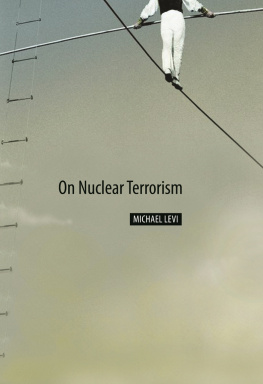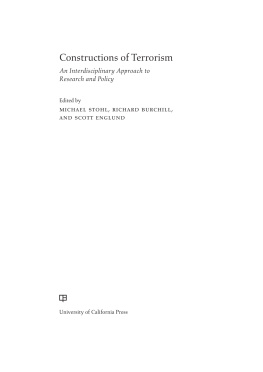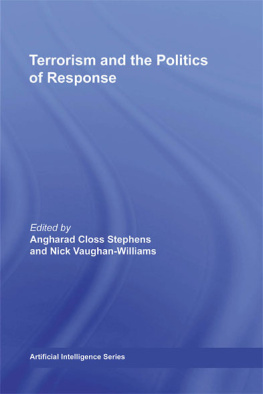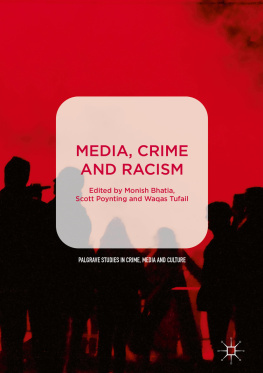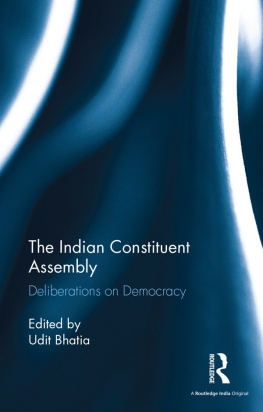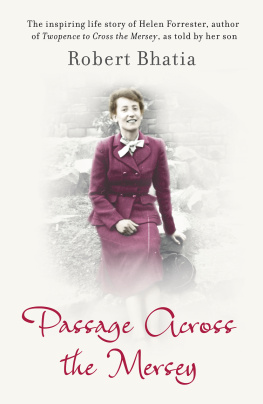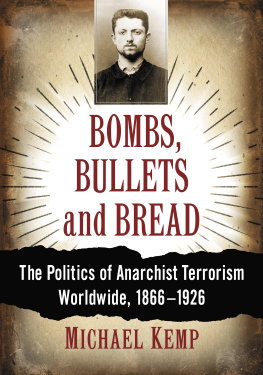Terrorism and the Politics of Naming
Names are not objective, they accrue subjective associations. For example 'Terrorist' has a very different connotation to 'Freedom-fighter'.
This volume assesses the nature, power, role and function of names in global politics and the international media. It seeks the truth beneath the names assigned in an effort to remove the obscurity created by the power of 'the politics of naming' to the reality of the situation. Taking examples from Al-Qaeda, Russia's demonisation of the Chechens, naming in the Israeli-Palestine conflict and other important contemporary debates, Terrorism and the Politics of Naming makes a substantial contribution towards elucidating the power of naming in the discourse of conflict.
This book was previously published as a special issue of Third World Quarterly .
Michael Bhatia is at the Department of Politics and International Relations at the University of Oxford.
First published 2008
by Routledge
2 Park Square, Milton Park, Abingdon, Oxon, OX14 4RN
Simultaneously published in the USA and Canada
by Routledge
270 Madison Avenue, New York, NY 10016
Routledge is an imprint of the Taylor & Francis Group, an informa business
2008 Third World Quarterly
Typeset in Times by KnowledgeWorks Global Limited, Southampton, UK
Printed and bound in Great Britain by
All rights reserved. No part of this book may be reprinted or reproduced or utilised in any form or by any electronic, mechanical, or other means, now known or hereafter invented, including photocopying and recording, or in any information storage or retrieval system, without permission in writing from the publishers.
British Library Cataloguing in Publication Data
A catalogue record for this book is available from the British Library
Library of Congress Cataloging in Publication Data
A catalog record for this book has been requested
ISBN 10: 0-415-41372-9 (hbk)
ISBN 13: 978-0-415-41372-5 (hbk)
Michael Bhatia is a 2001 George C Marshall Scholar and doctoral candidate at St Antony's College and the Department of Politics and International Relations, University of Oxford. He has served as a researcher at the Afghanistan Research and Evaluation Unit in Kabul, Afghanistan; as a Scoville Peace Fellow at the Center for Strategic and Budgetary Assessments in Washington, DC; and as a research assistant at the Watson Institute for International Studies, Brown University. He is the author of War and Intervention : Issues for Contemporary Peace Operations (2003), and has also worked and researched in East Timor, Kosovo and the Sahrawi refugee camps in the Algerian Sahara.
James Der Derian is Professor of Political Science at the University of Massachusetts at Amherst and Professor of International Relations (Research) at Brown University, where he directs the InfoTechWarPeace Project (www.infopeace.org). He has been a visiting scholar at the Universities of Southern California, MIT, Harvard and Oxford, and at the Institute for Advanced Study at Princeton. He is the author of Virtuous War: Mapping the Military Industrial Media Entertainment Network (2001), On Diplomacy: A Genealogy of Western Estrangement (1987) and Antidiplomacy: Spies, Terror, Speed, and War (1992); editor of International Theory: Critical Investigations (1995) and The Virilio Reader (1998); and co-editor with Michael Shapiro of International/Intertextual Relations: Postmodern Readings of World Politics (1989).
Christina Hellmich is a 2003 Leverhulme Scholar and doctoral candidate in Middle East Studies at Oxford University. She holds graduate degrees in international relations and oriental studies from the University of Oxford and University of St Andrews and is currently pursuing medical training at the University of Bochum, Germany. During extended field work in Yemen she analysed the role of Islamic preaching as a medium for the communication of Islamic fundamentalism. Her doctoral thesis examines the impact of Islam and tradition on women's comprehensive health care.
Robert L Ivie is Professor of Communication and Culture at Indiana University, Bloomington, and a member of the faculties of American Studies, Cultural Studies and Myth Studies. He is the founding editor of Communication and Critical/Cultural Studies. He recently completed a book manuscript on Democracy and America's War on Terror , and is co-author of Cold War Rhetoric: Strategy, Metaphor, and Ideology (1997) and Congress Declares War: Rhetoric, Leadership, and Partisanship in the Early Republic (1983).
Michael J Schroeder is an independent scholar who received his PhD in History at the University of Michigan in 1993. He has taught US and Latin American history at the University of Michigan-Flint and at Eastern Michigan University. He was awarded an Honorable Mention Prize at the 1997 Conference on Latin American History for his article 'Horse thieves to rebels to dogs', ( Journal of Latin American Studies, October 1996); and is currently completing a book manuscript, The Sandino Rebellion: Tragedy and Redemption in the Mountains of Northern Nicaragua, 1926 1934 .
Suthaharan Nadarajah is a doctoral candidate in the Department of Politics, School of Oriental and African Studies, University of London. His research explores the international system as a socialising and subject producing device, using the conflict in Sri Lanka as a case study. Dhananjayan Sriskandarajah is a doctoral student in the School of Geography and the Environment, University of Oxford. His research examines the political economy of ethno-political conflict in several developing countries, including Sri Lanka.
John Russell is a Senior Lecturer in Peace Studies at the University of Bradford, where he previously served as the Head of the Department of Languages and European Studies. With expertise in Russian and terrorism studies, he has lectured widely and has had a number of articles published on the Russo-Chechen wars. In 2003 he was called as an expert witness for the defence in the extradition proceedings brought by the Russian government against one of the leaders of the Chechen resistance, Akhmed Zakayev. He is currently working on separate books about this trial and the war in Chechnya.
James McDougall is an Assistant Professor in the History Department at Princeton University. Previously he held a Leverhulme Trust research fellowship at the Middle East Centre of St Antony's College, Oxford. His publications include Nation, Society and Culture in North Africa (2003), Colonial Words: History and the Culture of Nationalism in Algeria (forthcoming 2005) and several articles on contemporary North African history and politics.
Eyal Ben-Ari is a Professor in the Department of Sociology and Anthropology of the Hebrew University of Jerusalem. His current research focuses on the field units of the Israeli military in the current conflict with the Palestinians and on the present-day Japanese self-defence forces. He is the author of Mastering Soldiers: Conflict, Emotions and the Enemy in an Israeli Military Unit (1998); and the co-editor of Japan in Singapore: Cultural Presences (2000), The Military and Militarism in Israeli Society (2000), and War, Politics and Society in Israel: Theoretical and Comparative Perspectives (2000). Neta Bar is a doctoral student in the Department of Cultural Anthropology at Duke University.




